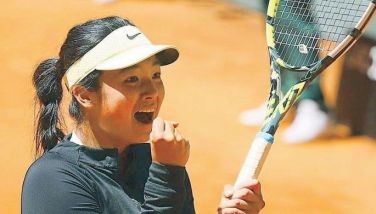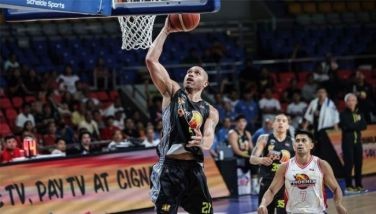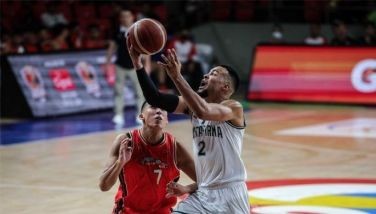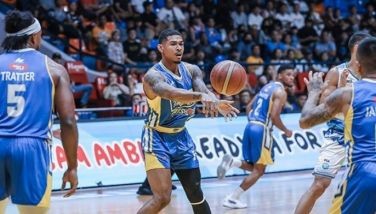A Filipino sports culture?
It appears that Filipinos are flexible and malleable in most things they set their minds to, whether it be at work or even in sports, as proven by the experience of tens of millions of overseas Filipino workers. At the Technical Skills Development Authority or TESDA, female welders are becoming one of the country’s largest human exports except to the Middle East. When it comes to sports, wherever they are, Filipinos are able to adapt to what is being played here or abroad, with basketball being the one unchangeable constant.
For example, in places like Dubai, where the PBA regularly visits and ALA Promotions has been holding fights since 2014, Filipinos seek out venues to play hoops on weekends. Though the sports in rich, predominantly Muslims locales usually range between common Commonwealth sports and sports for the affluent like badminton to yachting, Filipinos working there make room for regular games with their countrymen and other foreigners they have influenced into the game. Of course, this also serves to widen their circle of influence and diversify their circles of friends, as well.
Even in the most challenging places to find leisure, Filipinos can’t get enough of basketball. In the small nation of Brunei which this writer spent 10 days in earlier this year, basketball is alive and well and wearing a Filipino face. Just imagine the following scenario, if you will. It is a place where no alcoholic beverages are served, and there is no nighttime entertainment. The only diversions after dark are movies and hanging out at the one cavernous Starbucks which serves the roughly 300,000 people there. Even foreign entertainers from the biggest singers to stand-up comics like Russel Peters have been hard-pressed to acquire permits to perform, unless they are doing command performances for the royal family. Due to the dearth of entertainment, Filipinos there play basketball not just on weekends, but three times a week. Here you will find many former junior NCAA and college players, and a few coaches taking to the court with more frequency than they do back home. Some are even hired as imports for invitational leagues in nearby countries like Malaysia, Singapore and Hong Kong, China.
Even in their own country, Filipinos take to new sports very quickly. Lawn bowls and petanque, both outdoor European ball games, have taken root in Angeles, Pampanga, and are slowly growing in participation. Introduced by expats who have retired to the quieter Pampanga locale instead of its more stressful counterparts in Metro Manila, both sports became a local staple after a few years. In the 2011 Southeast Asian Games in Indonesia, the seven-man Philippine petanque team was made up of the only people who played the sport in the entire country. And even then, the Philippines fell only one match short of a medal. Since then, they have brought in fresh players, and have set up a training program for youth who want to earn scholarships and be on a national team. Lawn bowls has been a ticket to train and travel for talented Kapampangans, as well, with Angeles hosting the lawn bowls competition in the 2005 SEA Games.
Filipinos have also been influential in bringing our own brand of sports around the world, too. From the late 1980’s until his death seven years ago, Grandmaster Roland Dantes made it his mission to teach arnis or, as it is known abroad, Filipino Martial Arts (FMA). To this day, Supreme Grandmaster Cacoy Cañete of Cacoy Doce Pares, likewise travels around the world to breed new master, despite being 93 years old. Cañete’s gym in Cebu has been operating non-stop since 1949. His biennial gatherings in the Queen City of the South are attending by the greatest stick fighters from more than 20 countries. His grandson, Chuck, has been hailed world champion and similarly travels on his own to teach and certify masters and coaches for the sport, which is growing rapidly in parts of Europe and Australia.
There are many more instances of communities growing their own unfamiliar sports successfully. The former Philippine Rugby Football Union (PRFU) went from zero to the Rugby 7s World Cup in under a decade, and created a demand for Filipino-foreign athletes in places like Japan, where rugby is played on a larger commercial scale. In fact, the Philippine women’s team was even invited to the Hong Kong 7s ahead of the men four years ago. A slower process is taking place in American football, where the Philippines has gotten in on the ground floor of Asian development in the sport. The country has hosted two international friendlies already, and tackle football is now an outlet for athletes from other sports who are seeking more physical contact.
In Cebu, the long-term impact of growing their own sports culture is even more palpable. Beginning with dancesport, Cebu has been conquering the Guinness Book of World Records with surprising regularity. First, Edward Hayco of Team Cebu City Dancesport grew the sport through volunteer instructors into a summer program with over 3,000 graduates. Learning that Guinness had recognized Budapest, Hungary, which had a smaller dance class, Hayco and the city government shattered that record with a class of 7,770 dancers. Two years later, as head of the Cebu City Sports Commission, Hayco’s team taught all the city public school teachers chess, and cascaded the knowledge down to the students. In 2011, they again set a new standard with over 11,000 children playing the game. In 2013, Cebu took aim at the world record for number of archers, using curved PVC pipes for bows. This year, they aim to set an unbreakable mark in stick fighting.
All over the world, Filipinos and their half-Filipino offspring have won at the world level in golf, soccer, diving, figure skating, archery, darts, billiards, extreme sports, tackle football and many others. It seems an innate ability to rapidly absorb and master a new sport under challenging circumstances. It may be difficult to pinpoint exactly what Filipino sports culture is, but all this achievement points to one thing: Filipinos are gifted in sports. The question left unanswered is how we may best harness and hone all that raw talent scattered all over the globe. Once we do, there will be so many sports wherein the Filipino will be simply unbeatable.
- Latest
- Trending































